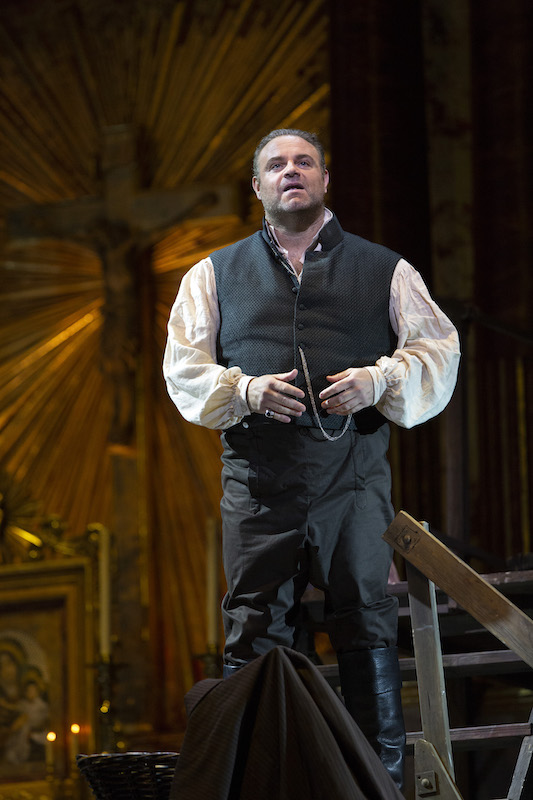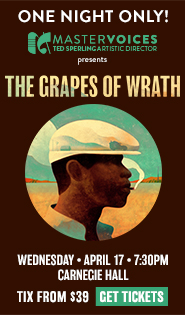Sickness strikes again, but Calleja and Koch make Met’s “Tosca” a great night

Joseph Calleja stars in the Metropolitan Opera production of Puccini’s “Tosca.” Photo: Marty Sohl
It’s been a rough cold-and-flu season in New York, and especially at the Metropolitan Opera. Last week’s Samson et Dalila saw tenor Aleksandrs Antonenko felled after one act. And on Monday night, the Met went to its bench again, when Jennifer Rowley, set to lead a new cast of Tosca, fell ill.
Replacing her was Iulia Isaev, a Romanian soprano who was making her Met debut, despite having an established career. Given the circumstances, her performance on Monday was impressive: she displayed a warm, focused tone that was remarkably consistent throughout the night, save for a little tightness at the top, which forced her to cut short the climactic B flat in “Vissi d’arte.” Without much chance to rehearse, Isaev’s portrayal was generalized yet effective, sweeping majestically about the stage. That is an approach that can work in the current David McVicar production, which creates enough vivid scenic settings to keep the viewer grounded in the opera, even when individual performances lack specificity.
Joseph Calleja was announced as being under the weather, as well, and indeed there was clear evidence of phlegm on his top notes. Nonetheless, his performance as Cavaradossi was one of his best at the Met—he showed off full, caramel color from top to bottom, with a buttery ring in his upper range. He brought considerable nuance to his rendition of the Act III aria “E lucevan le stelle,” trying to contain his emotions early on and letting the spill out more and more as the aria progressed. In spite of his illness, Calleja maintained a thrilling energy all night, particularly in his rash defiance of Scarpia in Act II.
Wolfgang Koch, who withdrew from the October run of the production, finally made his long-awaited company debut as Scarpia. His voice is small for the Met, and pushing for volume at times led him to strain his otherwise oaken tone. But Scarpia is more a dramatic than a lyric character, and as a presence on the stage Koch is sensational. More than just a glowering tyrant, Koch’s Scarpia was almost glib in his cruelty, pursuing Tosca with a quiet menace. The overall subtlety of his portrayal made his outbursts of rage, such as in his furious interrogation of Cavaradossi, all the more bracing by contrast.
Oren Gradus struggled as Angelotti, the fugitive consul of the Roman Republic, his voice sounding rough and lacking in volume. Philip Cokorinos delighted with his comic antics as the harried Sacristan, and Tony Stevenson sang with an unusually clear tenor as Spoletta, Scarpia’s top toady.
Carlo Rizzi, who led the fall performances, was once again brilliant in the pit, crafting a vivid account of Puccini’s score. Gorgeously balanced and paced, his reading had all the richness and cinematic size necessary for the piece, but left room for smaller, more intimate touches, as well. Every moment seemed to have a precise meaning, whether revealing the inner thoughts of the characters or underlining the drama of the events onstage. In performances like this, the orchestra becomes a fourth leading character, emphasizing Puccini’s genius in making Tosca a cohesive work of inseparable drama and music.
Tosca runs through April 6 at the Metropolitan Opera. metopera.org




Posted Mar 22, 2019 at 4:20 pm by Diana Smith
We were delighted and thrilled at the March 22 Tosca performance. Julia Isabel did not disappoint as Tosca. Her stage presence was captivating. The entire cast made the story come alive. Thank you to everyone involved for such an enjoyable performance.
Posted Apr 01, 2019 at 12:32 pm by Theresa Marsh
Greetings to the Met:
I attended the Friday evening, March 29th, production of Tosca. As a voice student, I am primed to listen for vocal technique and to expect vocal power. My teacher demands that I “fill the room.” Understanding the impact of illness on a singer’s ability to produce, I willingly adjusted my expectations. I was perplexed, however, about a few casting decisions. The production as a whole was a scenic wonder, but opera, for me, is about the voice. Perhaps, singers’ contracts overruled voice suitability for the Met.
Having 50 years of stage experience, I am empathetic to a performer who must struggle with costumes and props. In Act I, Tosca kneels to insert flowers into a vase. From Row U, it appeared to me that the flower stems were much too long for the vase and that the vase was not weighted. Tosca fussed with the placement of the flowers, and I feared a toppled vase. The moment looked clumsy when it should have appeared to be one of the most graceful visuals.
Some directorial oversights weakened my experience as well. I questioned, for example, the placement of Floria singing downstage left as the brass section powered through an exciting score; she could not be heard. Mario signs his own death warrant? These are just two directorial missteps that my teacher and I identified on our 2-hour return trip to Philadelphia.
It’s just those little oversights that can chip away at the big thing to reduce its impact. It’s the Met, and I expected a tighter ship.
Thank you for this opportunity to express my opinion.
Best regards,
Theresa
Posted Apr 08, 2019 at 5:22 am by Adrian
Reading the review and comparing it to the experience of listening in the UK to the April 6 broadcast, I would say it was a battle of the howlers. Tosca often descends into a screaming match unless it is contained and Calleja/Koch both sounded under a great deal of strain. This was particularly evident in the extreme top of Calleja’s voice which, at least over the airwaves, was just a holler.
Gradus was a terrible Angelotti, rarely hitting the notes on the stave accurately but sounding tortured, at least. Rowley seemed to cope best of all and turn histrionics to her advantage with a schizophrenic performance but some of the most accomplished singing came from Mr Stevenson as Spoletta and a fine Sacristan. One man’s opinion from the comfort of his lounge.